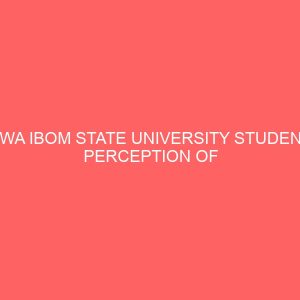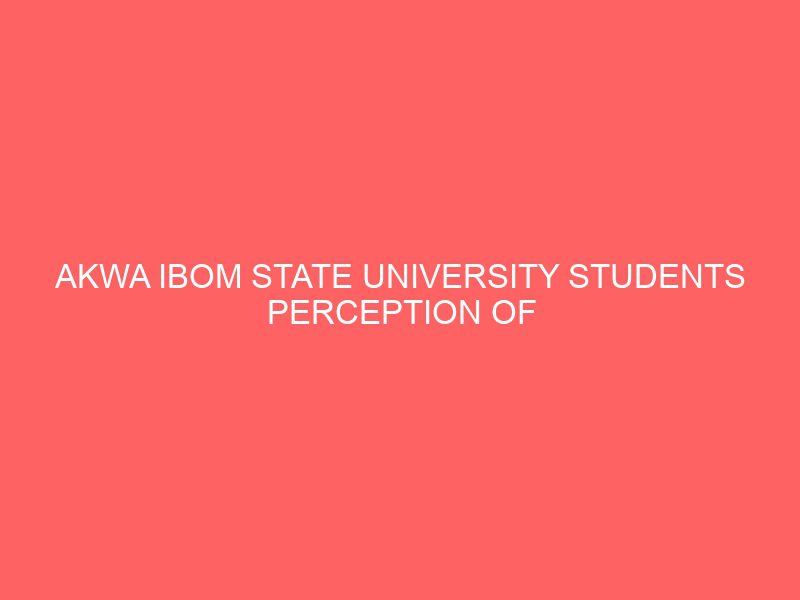Description
CHAPTER ONE
INTRODUCTION
- Background of the Study
This research is on Akwa Ibom state university students perception of Nollywood. The Nigerian audiences’ first experience in film screening was in 1903 at the Glover Memorial Hall, and enthralled the audience was! (Uchegbu 1992). Even though film was introduced by a European merchant, it took the combined efforts of the colonial administration and the church to sustain the industry (Ekwuazi 1987: 1). The content of such films can be easily discerned. The British colonialist used it for their “civilizing” mission as well as to indicate the blessedness of being colonized. The church, as their involvement in education and the media industry has shown, used films for spreading the gospel.
However, the Nigerian film has grown in leaps and bounds on all indicators. But it was not always so. Adesanya (1997: 15) notes that cost of production greatly hampered film production. Film makers unable to cope with cost of shooting on celluloid first turned to reversal film stock and later on, video tapes (ibid). So unlike the American and Indian film industry, the Nigerian film industry popularly called Nollywood uses the video cassette format and recently the Video Compact Disc (VCD). As a consequence, the films are not shown in Cinema houses since they are shot straight into video tapes, replicated and sold for home viewing hence the term home videos. And it is this ingenuity that has changed the face of the Nigerian film industry.
The boom the home video industry is experiencing is credited to Nigerian businessmen of Igbo extraction, particularly Kenneth Nnebue, an electronic dealer and film promoter (Haynes and Okome 1997: 24). The businessmen they claimed understood that a retail market could be opened up by the sale of video Attitude of Audience Members to Nollywood Films films. Kenneth Nnebue’s first film Aje Ni Iya Mi was very profitable and hence served as a booster shot to home video productions. This is in spite of the fact that it was actually Yoruba travelling theatre artistes who began making video films in 1988 (Haynes and Okome 1997: 23).
Early Nigerian films thematically emphasised culture and history and to some extent morality and politics, but contemporary social realities were left out because of the financial constraints experienced by film makers (Shehu 1992: 138–139). Perhaps, the success of Nollywood could be attributed to the ability of present day film makers to emphasise contemporary realities which many Nigerians and Africans can relate to. The cultural aspect is still present though.
The themes of Nollywood films are indeed broad and covering Nigerian, African and universal issues:
… scourge of Vesico Vaginal Fistula (VVF), female genital mutilation, evils of polygamy, extra marital affairs, elopement, different forms of rituals, cultism, betrayal, sibling rivalry, the activities of hired assassins and armed robbers, the spirit world, mermaids, witchcraft, work place rivalry, incest, hypocrisy of religious leaders, the world of twins, mother-in-law problems, parental match making, clash of Western and traditional cultures, conflicts, sexual intercourse with housemaids, Christianity, Islam and traditional religion, landlords and tenants, sickle cell anaemia, barrenness, challenges to love and lovers, widowhood practices, unemployment, street children, search for roots, abandonment of aged parents, teenage pregnancy, overemphasis on male children, “first lady” syndrome, effects of bad upbringing on children, the police, drug trafficking, marriage, angry gods and goddesses, campus life, tribal conflicts, curses, conflict between rich and poor, proliferation of Churches, switching of babies at birth, surrogate motherhood, slavery, organized crime, home abandonment, prostitution, cancer, rivalry over titles, smuggling, HIV/AIDS, battle between good and evil, murder, handicaps, late marriage, history, destiny… (Akpabio 2003: 138–139)
But the industry has been accused of over emphasizing negative themes. The National Film and Video Censors Board, the industry regulatory body, in its guidelines for motion picture producers called for productions to be above board in portrayal of violence, crimes, sex and pornography, vulgarity, obscenity, religion and other sensitive subjects (NFVCB 2000: 107–111). Similarly, the board, in a warning notice titled “The Need for a New Direction in Nigerian Film Content”, decried the emphasis on negative themes. It imposed a ban on I hate my village1 for promoting cannibalism and failing to uphold Nigeria’s cultural values. The board also placed bans on seven films – Shattered Home, Outcast 1&2, Night Out (Girls for Sale), Omo Empire, Issakaba 4, Terrorist Attack and Unseen Forces. National Film and Video Censors Board Press Release tiled “Censors Board bans ‘I hate my village’”. Limitless freedom and lawlessness by our movie makers [which] is drowning the industry with mostly repetitive or recycled films on a few themes that hinge on sex, rituals, blood and gore The Guardian , (2002)
The Nigerian Minister of Information, Mr. Frank Nweke, has also lamented the emphasis on negative themes claiming that it gives the country a bad image: “You can have stories that talk on things like voodoo but when it is overdone and made the centre of any offering, that is when it becomes a problem because the more people see it, the more they will think that our country is all about voodoo practice”. www.ngrguardian.com. Veteran Nigerian film maker, Eddie Ugboma, also has hard knocks for the slant of the films claiming that they originate from hell. Vanguard, (1998)
1.2 Problem Statement
The boom in home video productions and the corresponding audience interest have attracted a lot of attention to the sector. There is hardly any newspaper in Nigeria that does not devote space to this phenomenon. A lot has been written on the technical quality and aesthetics of the home video productions. The slants of the comments have always been against the emphasis on sex, violence, fetishism and other negative tendencies. Similarly, the production quality of these films has also been severely criticized.
In spite of these criticisms, new video films are daily released into the market thus necessitating this study. Therefore, it is against this background that this research work is conducted to examine Akwa Ibom State University student’s perception of nollywood.
1.3 Objectives of the Project
The main objective to this study is to investigate the Akwa Ibom State University students perception of nollywood. While the specific objectives were:
- To examine the disposition of Akwa Ibom State University students to sex, fetishism, violence etc. in nollywood movies
- To explore the students’ perception of dress pattern on nollywood movies
- To find out the aspects of the nollywood movies that appeals to AKSU students.
- To find out how AKSU students perceive the nollywood movies.
1.4 Relevance of the Study
The significance of this study can be viewed from the following perspectives. Provide an in-depth analysis of students perception with regards to nollywood movies.
One unique significant of this study is that upon completion, it would serve as a bridge for the gap that have been created between where previous works on this subject area stopped and today.
This study is significant in the sense that its finding would serve as a base and framework for future researchers to carry out further studies in the field of knowledge under study.
The outcome of this research is hoped to be of immense use to students of mass communication and communication arts in view of the fact that it contains information home videos and public perception.
The significance of this study would include all those who would benefit from and use the information from the study like researchers or students of organizational behaviour, policy makers as well as producers and markers of home videos.
1.5 Delimitation of the Study
The study was delimited to Akwa Ibom State University students perception of nollywood.
1.7 Conceptual and Theoretical Definition of Terms
Home movies: This is any pre-recorded media films played and viewed by students with their movie players in their homes or movie clubs. These films are viewed with the aid of a TV set which is connected to the movie machine.
Students in tertiary institutions: These are post secondary school students in polytechnics, colleges of education and universities.
Influence: This is the impact something or someone has on something or someone else. This could be positive or negative.







Reviews
There are no reviews yet.